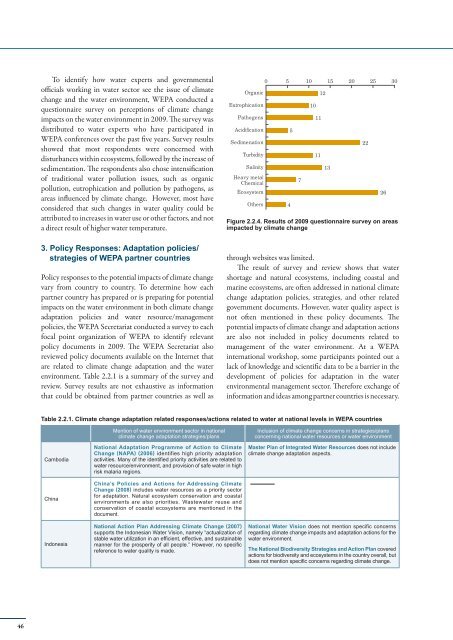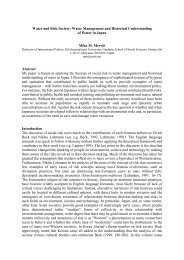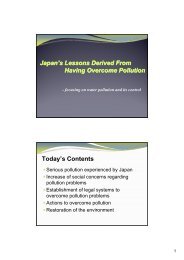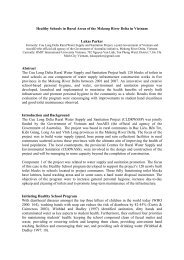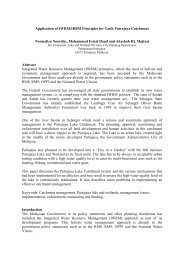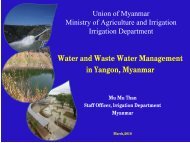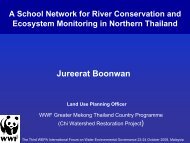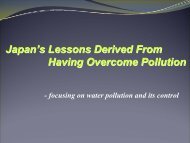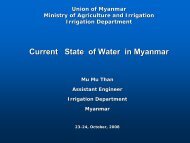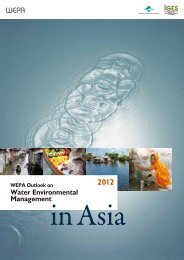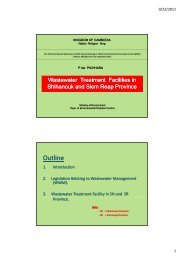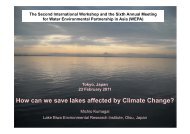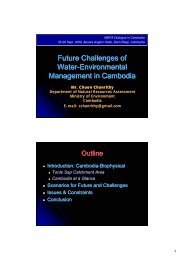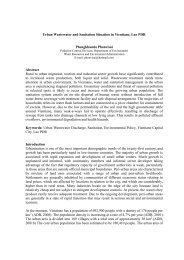To identify how water experts and governmentalofficials work<strong>in</strong>g <strong>in</strong> water sector see the issue of climatechange and the water envir<strong>on</strong>ment, <str<strong>on</strong>g>WEPA</str<strong>on</strong>g> c<strong>on</strong>ducted aquesti<strong>on</strong>naire survey <strong>on</strong> percepti<strong>on</strong>s of climate changeimpacts <strong>on</strong> the water envir<strong>on</strong>ment <strong>in</strong> 2009. The survey wasdistributed to water experts who have participated <strong>in</strong><str<strong>on</strong>g>WEPA</str<strong>on</strong>g> c<strong>on</strong>ferences over the past five years. Survey resultsshowed that most resp<strong>on</strong>dents were c<strong>on</strong>cerned withdisturbances with<strong>in</strong> ecosystems, followed by the <strong>in</strong>crease ofsedimentati<strong>on</strong>. The resp<strong>on</strong>dents also chose <strong>in</strong>tensificati<strong>on</strong>of traditi<strong>on</strong>al water polluti<strong>on</strong> issues, such as organicpolluti<strong>on</strong>, eutrophicati<strong>on</strong> and polluti<strong>on</strong> by pathogens, asareas <strong>in</strong>fluenced by climate change. However, most havec<strong>on</strong>sidered that such changes <strong>in</strong> water quality could beattributed to <strong>in</strong>creases <strong>in</strong> water use or other factors, and nota direct result of higher water temperature.3. Policy Resp<strong>on</strong>ses: Adaptati<strong>on</strong> policies/strategies of <str<strong>on</strong>g>WEPA</str<strong>on</strong>g> partner countriesPolicy resp<strong>on</strong>ses to the potential impacts of climate changevary from country to country. To determ<strong>in</strong>e how eachpartner country has prepared or is prepar<strong>in</strong>g for potentialimpacts <strong>on</strong> the water envir<strong>on</strong>ment <strong>in</strong> both climate changeadaptati<strong>on</strong> policies and water resource/managementpolicies, the <str<strong>on</strong>g>WEPA</str<strong>on</strong>g> Secretariat c<strong>on</strong>ducted a survey to eachfocal po<strong>in</strong>t organizati<strong>on</strong> of <str<strong>on</strong>g>WEPA</str<strong>on</strong>g> to identify relevantpolicy documents <strong>in</strong> 2009. The <str<strong>on</strong>g>WEPA</str<strong>on</strong>g> Secretariat alsoreviewed policy documents available <strong>on</strong> the Internet thatare related to climate change adaptati<strong>on</strong> and the waterenvir<strong>on</strong>ment. Table 2.2.1 is a summary of the survey andreview. Survey results are not exhaustive as <strong>in</strong>formati<strong>on</strong>that could be obta<strong>in</strong>ed from partner countries as well asOrganicEutrophicati<strong>on</strong>PathogensAcidificati<strong>on</strong>Sedimenati<strong>on</strong>TurbiditySal<strong>in</strong>ityHeavy metalChemicalEcosystemOthers0 545710 15 20 25 3010Figure 2.2.4. Results of 2009 questi<strong>on</strong>naire survey <strong>on</strong> areasimpacted by climate changethrough websites was limited.The result of survey and review shows that watershortage and natural ecosystems, <strong>in</strong>clud<strong>in</strong>g coastal andmar<strong>in</strong>e ecosystems, are often addressed <strong>in</strong> nati<strong>on</strong>al climatechange adaptati<strong>on</strong> policies, strategies, and other relatedgovernment documents. However, water quality aspect isnot often menti<strong>on</strong>ed <strong>in</strong> these policy documents. Thepotential impacts of climate change and adaptati<strong>on</strong> acti<strong>on</strong>sare also not <strong>in</strong>cluded <strong>in</strong> policy documents related tomanagement of the water envir<strong>on</strong>ment. At a <str<strong>on</strong>g>WEPA</str<strong>on</strong>g><strong>in</strong>ternati<strong>on</strong>al workshop, some participants po<strong>in</strong>ted out alack of knowledge and scientific data to be a barrier <strong>in</strong> thedevelopment of policies for adaptati<strong>on</strong> <strong>in</strong> the waterenvir<strong>on</strong>mental management sector. Therefore exchange of<strong>in</strong>formati<strong>on</strong> and ideas am<strong>on</strong>g partner countries is necessary.111112132226Table 2.2.1. Climate change adaptati<strong>on</strong> related resp<strong>on</strong>ses/acti<strong>on</strong>s related to water at nati<strong>on</strong>al levels <strong>in</strong> <str<strong>on</strong>g>WEPA</str<strong>on</strong>g> countriesCambodiaCh<strong>in</strong>aInd<strong>on</strong>esiaMenti<strong>on</strong> of water envir<strong>on</strong>ment sector <strong>in</strong> nati<strong>on</strong>alclimate change adaptati<strong>on</strong> strategies/plansNati<strong>on</strong>al Adaptati<strong>on</strong> Programme of Acti<strong>on</strong> to ClimateChange (NAPA) (2006) identifies high priority adaptati<strong>on</strong>activities. Many of the identified priority activities are related towater resource/envir<strong>on</strong>ment, and provisi<strong>on</strong> of safe water <strong>in</strong> highrisk malaria regi<strong>on</strong>s.Ch<strong>in</strong>a’s Policies and Acti<strong>on</strong>s for Address<strong>in</strong>g ClimateChange (2008) <strong>in</strong>cludes water resources as a priority sectorfor adaptati<strong>on</strong>. Natural ecosystem c<strong>on</strong>servati<strong>on</strong> and coastalenvir<strong>on</strong>ments are also priorities. Wastewater reuse andc<strong>on</strong>servati<strong>on</strong> of coastal ecosystems are menti<strong>on</strong>ed <strong>in</strong> thedocument.Nati<strong>on</strong>al Acti<strong>on</strong> Plan Address<strong>in</strong>g Climate Change (2007)supports the Ind<strong>on</strong>esian <strong>Water</strong> Visi<strong>on</strong>, namely “actualizati<strong>on</strong> ofstable water utilizati<strong>on</strong> <strong>in</strong> an efficient, effective, and susta<strong>in</strong>ablemanner for the prosperity of all people.” However, no specificreference to water quality is made.Inclusi<strong>on</strong> of climate change c<strong>on</strong>cerns <strong>in</strong> strategies/plansc<strong>on</strong>cern<strong>in</strong>g nati<strong>on</strong>al water resources or water envir<strong>on</strong>mentMaster Plan of Integrated <strong>Water</strong> Resources does not <strong>in</strong>cludeclimate change adaptati<strong>on</strong> aspects.Nati<strong>on</strong>al <strong>Water</strong> Visi<strong>on</strong> does not menti<strong>on</strong> specific c<strong>on</strong>cernsregard<strong>in</strong>g climate change impacts and adaptati<strong>on</strong> acti<strong>on</strong>s for thewater envir<strong>on</strong>ment.The Nati<strong>on</strong>al Biodiversity Strategies and Acti<strong>on</strong> Plan coveredacti<strong>on</strong>s for biodiversity and ecosystems <strong>in</strong> the country overall, butdoes not menti<strong>on</strong> specific c<strong>on</strong>cerns regard<strong>in</strong>g climate change.46
<str<strong>on</strong>g>WEPA</str<strong>on</strong>g> <str<strong>on</strong>g>Outlook</str<strong>on</strong>g> <strong>on</strong> <strong>Water</strong> Envir<strong>on</strong>mental <strong>Management</strong> <strong>in</strong> <strong>Asia</strong> <strong>2012</strong>Chapter 2.2 Climate Change and the <strong>Water</strong> Envir<strong>on</strong>mentJapanRpublic of KoreaNo nati<strong>on</strong>al strategies/plans <strong>on</strong> adaptati<strong>on</strong> exist. However, theM<strong>in</strong>istry of the Envir<strong>on</strong>ment formed an expert committee <strong>on</strong>climate adaptati<strong>on</strong>, which drafted the report, “Wise Adaptati<strong>on</strong>to Climate Change Impacts”. <strong>Water</strong> (both quantity and quality)is identified as a priority area for adaptati<strong>on</strong> <strong>in</strong> the report.The Fourth Nati<strong>on</strong>al Plan for Climate Change (2008-<strong>2012</strong>)<strong>in</strong>cludes mitigati<strong>on</strong> as well as adaptati<strong>on</strong> acti<strong>on</strong>s. No sectorspecific adaptati<strong>on</strong> acti<strong>on</strong>s are menti<strong>on</strong>ed.The M<strong>in</strong>istry of Land, Infrastructure, Transport and Tourismorganized an expert committee to c<strong>on</strong>sider the potential impactsof climate change <strong>on</strong> water resource management <strong>in</strong> the countryand necessary adaptati<strong>on</strong> acti<strong>on</strong>s.The M<strong>in</strong>istry of the Envir<strong>on</strong>ment is c<strong>on</strong>duct<strong>in</strong>g a three-yearstudy <strong>on</strong> climate change impacts <strong>on</strong> the water envir<strong>on</strong>ment andadaptati<strong>on</strong> acti<strong>on</strong>s from 2009. (The f<strong>in</strong>al report will be completed<strong>in</strong> <strong>2012</strong>.)The four major rivers restorati<strong>on</strong> program c<strong>on</strong>siders potentialclimate change impacts.Lao PDRMalaysiaThe Nati<strong>on</strong>al Adaptati<strong>on</strong> Programme of Acti<strong>on</strong> to ClimateChange (2009) <strong>in</strong>cludes water as a priority acti<strong>on</strong> area foradaptati<strong>on</strong>, but no statements related to water quality and waterecosystems are made <strong>in</strong> the secti<strong>on</strong> (flood and drought issuesbe<strong>in</strong>g the ma<strong>in</strong> agenda). Adaptati<strong>on</strong> acti<strong>on</strong>s for the public healthsector <strong>in</strong>clude the improvement of sanitati<strong>on</strong> and ensur<strong>in</strong>gpotable water quality.The Sec<strong>on</strong>d Nati<strong>on</strong>al Communicati<strong>on</strong> (SNC) (2011) menti<strong>on</strong>spossible water quality deteriorati<strong>on</strong> due to reduced or excessiveprecipitati<strong>on</strong>. Also, the SNC <strong>in</strong>cludes adaptati<strong>on</strong> c<strong>on</strong>cerns forwater, health and biodiversity, which are closely l<strong>in</strong>ked with thewater envir<strong>on</strong>ment.The Nati<strong>on</strong>al <strong>Water</strong> Policy (draft <strong>in</strong> 2010) identifies the needfor coord<strong>in</strong>ated programs to reduce the impacts of floods,droughts and climate change. The Acti<strong>on</strong> Plan 2011–15 doesnot specifically po<strong>in</strong>t out climate change impacts, but doesidentify priority acti<strong>on</strong> areas.The Nati<strong>on</strong>al Strategy <strong>on</strong> Envir<strong>on</strong>ment to 2020 and Acti<strong>on</strong>Plan for 2006-2010 does not <strong>in</strong>clude climate change adaptati<strong>on</strong>c<strong>on</strong>cerns for water and water envir<strong>on</strong>mental managementsectors.The Tenth Malaysia Plan (2011-2015) does not clearly identifyclimate change adaptati<strong>on</strong> as a challenge for water resourcemanagement, although flood and drought management isclearly <strong>in</strong>dicated <strong>in</strong> the secti<strong>on</strong> <strong>on</strong> climate change adaptati<strong>on</strong>(Chapter 6).Nati<strong>on</strong>al Policy <strong>on</strong> the Envir<strong>on</strong>ment does not <strong>in</strong>clude climatechange c<strong>on</strong>cerns regard<strong>in</strong>g the water envir<strong>on</strong>ment.MyanmarThe Nati<strong>on</strong>al Strategies and Acti<strong>on</strong> Plan for BiodiversityC<strong>on</strong>servati<strong>on</strong> <strong>in</strong>cludes a reference to aquatic ecosystemc<strong>on</strong>servati<strong>on</strong>.NepalNati<strong>on</strong>al Adaptati<strong>on</strong> Programme of Acti<strong>on</strong> to Climate Change(NAPA) (2010) does not <strong>in</strong>clude the water sector as an areafor adaptati<strong>on</strong> acti<strong>on</strong>s. The focuses of adaptati<strong>on</strong> acti<strong>on</strong>s arewater related disasters and the <strong>in</strong>creased vulnerability of waterresources <strong>in</strong> the country. Biodiversity and health issues are<strong>in</strong>cluded, but no statements menti<strong>on</strong> the relati<strong>on</strong>ship betweenthese sectors and water.The Nati<strong>on</strong>al <strong>Water</strong> Plan po<strong>in</strong>ts out the establishment of<strong>in</strong>formati<strong>on</strong> systems <strong>on</strong> water which may c<strong>on</strong>tribute to prepar<strong>in</strong>gfor climate change impacts.Philipp<strong>in</strong>esThe Nati<strong>on</strong>al Framework Strategy <strong>on</strong> Climate Change (2010-2022) (2010) <strong>in</strong>cludes ecosystem and water management askey result areas for adaptati<strong>on</strong> of the country. Ma<strong>in</strong>stream<strong>in</strong>gclimate change adaptati<strong>on</strong> <strong>in</strong> water resource policies is <strong>on</strong>e of thestrategic priorities under the key area of “water governance andmanagement”.The Integrated <strong>Water</strong> Resource <strong>Management</strong> Plan Framework(2006) <strong>in</strong>cludes c<strong>on</strong>cerns related to impacts <strong>on</strong> water supplydue to extreme events and ra<strong>in</strong>fall variability. It also identifiesimpacts <strong>on</strong> coastal and mar<strong>in</strong>e ecosystems.Sri LankaThe Nati<strong>on</strong>al Climate Change Adaptati<strong>on</strong> Strategies 2011-2016 identifies water as <strong>on</strong>e of the most vulnerable resourcesto climate change impacts <strong>in</strong> the country. Accelerati<strong>on</strong> of waterscarcity for irrigati<strong>on</strong> and dr<strong>in</strong>k<strong>in</strong>g purposes and exposure tofloods, droughts and salt water <strong>in</strong>trusi<strong>on</strong> are menti<strong>on</strong>ed. Theacti<strong>on</strong>s <strong>in</strong>cludes <strong>in</strong> the strategies cover those <strong>in</strong> the water sector,but there are no specific acti<strong>on</strong>s related to water quality.The Acti<strong>on</strong> Plan for the Haritha Lanka Programme (2008)<strong>in</strong>cludes acti<strong>on</strong>s related to the use of water resources, waterpolluti<strong>on</strong> and biodiversity, but does not <strong>in</strong>clude adaptati<strong>on</strong>acti<strong>on</strong>s <strong>in</strong> those sectors.ThailandThe Sec<strong>on</strong>d Nati<strong>on</strong>al Communicati<strong>on</strong> <strong>in</strong>cludes adaptati<strong>on</strong>acti<strong>on</strong>s, but no statements are c<strong>on</strong>ta<strong>in</strong>ed related to water quality.The Nati<strong>on</strong>al Policy <strong>on</strong> Envir<strong>on</strong>ment (2007-2011) identifiesrehabilitati<strong>on</strong> of watershed forests as an adaptati<strong>on</strong> acti<strong>on</strong>area, but no specific references <strong>on</strong> water quality or ecosystemc<strong>on</strong>servati<strong>on</strong>.Viet NamThe Nati<strong>on</strong>al Target Programme to Resp<strong>on</strong>d to ClimateChange recognizes the high vulnerability of the country’s waterresources to climate change. The decl<strong>in</strong>e of water resources,salt water <strong>in</strong>trusi<strong>on</strong>, and destructi<strong>on</strong> of aquatic ecosystems dueto changes <strong>in</strong> water flow and temperature are menti<strong>on</strong>ed <strong>in</strong> thedocument; however, the document does not address specificwater quality problems that may occur due to climate change(except<strong>in</strong>g <strong>in</strong>creased sal<strong>in</strong>ity).The Nati<strong>on</strong>al <strong>Water</strong> Resources Strategies towards 2020<strong>in</strong>cludes climate change as <strong>on</strong>e of the factors <strong>in</strong> the decl<strong>in</strong>e ofwater resources <strong>in</strong> the country.The strategies identify water polluti<strong>on</strong> and water ecosystemc<strong>on</strong>servati<strong>on</strong> as priority areas, but c<strong>on</strong>cerns over climate changeimpacts <strong>on</strong> the water envir<strong>on</strong>ment are not menti<strong>on</strong>ed.47


